People who know me for a long time know that I can’t get much offended if labeled as bookworm. I really like to read (and do it a lot). However, only those closest to me know that I have every year resolution to read more than 10,000 pages of books in calendar year (beyond other than magazines, blogs and news articles.) To my pleasure, I have missed on this commitment only once in last 10 years. On the contrary, 2019 was one of my record reading years as I managed to read 39 books (and in middle of 5 more of them). The imaginary 10K pages bar was exceeded by thousand of the pages in past year. However, I don’t aim to bore you too much with quantities, this blog strives for a different goal.
I carefully consider the books I buy, as I refrain from running away from started reading (even if it later proves to be not the best choice). Paying respect to author’s efforts, I try to finish the book till its end. Of course, even master carpenter sometimes cuts his finger, but thanks to careful selection, the pleasant surprises are outstretching the disappointments. And that’s why I decided to share with you Best of My 2019 Reading List. (Filtered for books that fit TheMightyData topics)
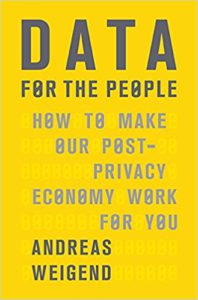 Data For The People
Data For The People
Topics: Data, Data Analytics, Privacy
Without hesitation and long introductions: This book is one of the best books on data analytics (and its implications) I’ve read in the last decadeIt not only gives you an overview of the trends in data and their analytics that you should understand. It also offers interesting social insights on how to work with data to benefit our civilization. If you read between lines, you will also understand in which areas we still underestimate the impact of the data and we need to add it properly. Therefore, if you are involved in data analytics or processing, I simply recommend reading this book as soon as possible.
Link: https://www.amazon.de/dp/B06XKTWVY9/
.
.
AI for Marketing and Product Innovation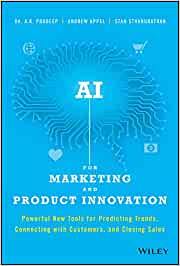
Topics: Artificial Intelligence, Marketing
Many dare to drag sugar coat how artificial intelligence will affect your business. But did they also give you specific recommendations on where to start and how to achieve your first success with AI solutions in your particular situation? Your answer may not surprise me. There is plethora of Oracles moving in mute AI waters. This book, in contrast, provides concrete examples of how to apply advanced data analytics and individual forms of artificial intelligence to Marketing and Product Management. Very unique, thus the more valuable cookbook and inspiration for almost every employee in the company.
Link: https://www.amazon.de/dp/1119484065/
.
.
 Meaningful: The Story of Ideas That Fly
Meaningful: The Story of Ideas That Fly
Topics: Management, Strategy Principles
Are you trying to come up with a concept or solution? Did you get a task you don’t know how to grab? Did you get burned on a project that seemed straightforward at first sight. Then you stand in front of a book that will guide you through how to design (and realize) ideas so that they are really useful and deliver what is expected of them. In short to be Meaningful, indeed.
Link: https://www.amazon.de/dp/0994432801/
.
.
AI Superpowers 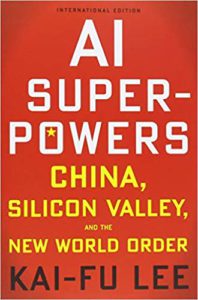
Topics: Artificial Intelligence
Finding a good book on Artificial Intelligence and its impact on society is really difficult feat. Topic is intensely hyped and real AI awareness is more pretended than achieved. Thus it is of immense value when someone truly knowledgeable explains the nature of Artificial Intelligence and its social impact, step by step. Kai Fu Lee is such a person. Moreover, as he comes from the Chinese environment first place, his views depict true country capabilities (and weak points) and goals of AI in China to the reader with neither Chinese shine nor Western propaganda. He serves valuable insights to why China’s development is moving the very direction and pace it takes. Let me, thus, express my forecast that Lee’s book will be a mandatory reading for the next decade for anyone who is aware artificial intelligence advent.
Link: https://www.amazon.de/dp/1328606090
.
.
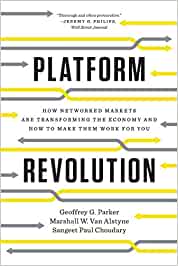 Platform revolution
Platform revolution
Topics: Web, E-commerce
Have you ever stumbled upon a book, you said, “Oh, God, if I had seen you before?” A few quarters back I led a project that sought to build a marketplace for services. Despite the fact that the project was full of experienced people, we were very anxious (and now I know that we have) made many serious mistakes. The Platform Revolution book intriguingly summarizes the principles of such E-commerce marketplaces and explains how to avoid the most common failures of this type of business. So if you are also “up to” to an E-commerce project, I recommend you reading this book.
Link: https://www.amazon.de/dp/0393354350/
.
.
Blitz Scaling 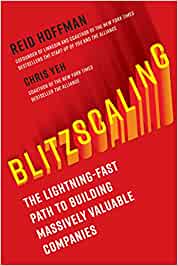
Topics: Business strategy, Growth strategies
Sometimes there is no need to tip-toe around hot pot. The reason to read this book is very simple. As is it is to frame target audience for this book. If you have the happen to have responsibility for getting a business (or process) into higher gear, be sure to read Blitz Scaling. Moreover, it is also interesting read for ordinary mortal who wants to understand which services around us will grow steeply in the near future and which will curb instead.
Link: https://www.amazon.de/dp/1984822454
.
.
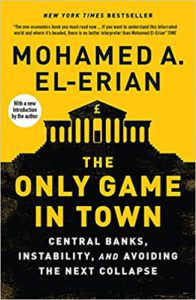 The Only Game In Town
The Only Game In Town
Topics: Financial Markets
As the saying goes: After the war everyone is a general.” In economy this maxim turns into small variation of “After the crisis everyone is an economic analyst who predicted it”. However, what should you do if you work among central bankers (and others who run the financial markets), you see an upcoming problem, but you are in a brutal minority. Well, if you are a Mohamed A. El-Erian (manager managing perhaps the largest portfolio of mutual funds), you will write a good book about it so that you open the eyes of many others. If you are eager to understand why another crisis is in baking up and who to blame for it this time, invest a few hours of your time in reading this book.
Link: https://www.amazon.de/dp/0300222637/
.
.
AI Does Not Hate You 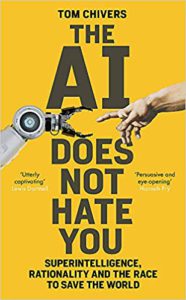
Topics: Artificial Intelligence
Did you read Nick Bostrom’s 21st Century Bible? Did you get interested and would like to expand your horizon even further? Then I have good news for you. Tom Chivers took the effort not only to write some sort of free continuation (and conclusions extension) brought to Bostrom. He has also worked out a sort of summarizing layer that will give you a better understanding (of Bostrom himself and) why most people who understanding the AI trends are more cautious pessimists than current development enthusiasts. As the title of the book itself suggests, it is not necessary to take it personally. That AI (apparently) will replace your work is no less or more certain than it replacing your neighbor’s work. But how to look despite these prospects with joy into future can be found in this very book.
Link: https://www.amazon.de/dp/1474608787/
.
.
 The Shortest History Of Germany
The Shortest History Of Germany
Topics : History, General Knowledge
I admit, this recommendation is a little consequence of me living in Germany for last years. But the reason why I recommend you read this book is that in, literally, few hours you will embrace the whole relevant European context. You will understand why Germany is Europe’s driving force today, even though most of history it was not. You will understand why a third of Berlin spoke French even before Napoleon arrived, how the Reformation was related to the advent of Hitler, and why, in fact, East Germany was a Cinderella whom many were still afraid of. This book is an instant extension of your cultural IQ. Even if you do not live in Germany neither you are a history fan, I still urge you to read this subtle book.
Link: https://www.amazon.de/dp/1910400734
.
.
Turning The Flywheel
Topics: Business Strategy, Development, Growth
You may laugh loud, but I would criticize this book for just one thing: it is too short. Turning The Flywheel is actually one of the shortest books I’ve read. (only 48 pages). But the shorter the print, the more intense her message is. Even in such a limited space this booklet offers, you will find instructions on how to make your business or teamwork self-propelling. In other words, how to do things that in return synergically help to keep themselves well above average successful. If I wanted to be too simplistic: How to do ingenious things that spin on the flywheel yourself while you take a rest.
Link: https://www.amazon.de/dp/1847942555/
.
.
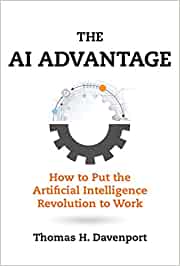 The AI Advantage
The AI Advantage
Topics: Artificial Intelligence
I had the chance to meet Tom Davenport in person (at a conference in London), and I have always been eager to swallow his books because I consider them to be a high-quality summary of important data analytics principles. In building analytical teams throughout my career I often gained inspiration. However, to be honest, his latest book was personally a bit disappointing to me. Maybe this is my bias (and that’s why perhaps a little controversial item in this reading suggestion). In some chapters I felt that I was not sure if the recommendations were based on real experience or that someone only “tipped” them to Tom. However, the book also has high-quality passages, so take the chance on it (and let me know how it turned out for you).
Link: https://www.amazon.de/dp/0262039176/
.
.
HUMAN + MACHINE 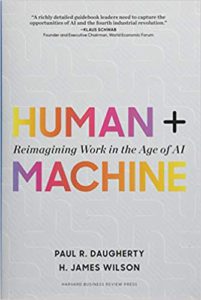
Topics: Artificial Intelligence, Human Labour
Skepticism about artificial intelligence’s negative impact on jobs is recently emerging quite a bit. There are relatively few books and articles that would compensate for this “bad mood” about AI’s role in the labor market. That is why HUMAN + MACHINE has been a jewel of recent days. It offers a counterbalance to the skeptical view of AI’s future and gives substantial hope for the masses. It strives to show how (realistically) machines and people will work together to fulfill the tasks & goals today done solely by humans. Thus, if you (want to) believe in good, this is a great stepping stone for you.
Link: https://www.amazon.de/dp/1633693864/
.
.
 The Infinite Game
The Infinite Game
Topics: Business Strategy, Leadership
Have you ever wondered why so many companies went bankrupt and even grandiose business plans fail? Does the waiter service make you cry or do you condemn fraudulent market practices? Simon Simek offers a very interesting look at this topic. Book will gradually guide you through realization that most companies consider business just a way from one mile-stone to another, resembling rather a sport event or a game session than a long-term strategy. As you read, you gradually understand that the human life, society, business (and many other things) has been there, and will stay, even once we individually pass out. It is a form of “indefinite game” in which most KPIs and short-term approaches are not only ineffective but down right counterproductive. This book is vital read for anyone who wants to do business honestly, lead people or live a meaningful life. The script is not necessarily for the masses. But therefore much more inspiring for those who do not seek shortcuts and who search recipe to do things properly.
Link: https://www.amazon.de/dp/0241295599/
.
.
Surrounded by idiots 
Topics: Personality, Personal profile
Do you want to know why people “piss you off”? Are you desperate in dealing with certain person? Then be sure to read this book. You may have encountered MBTI, DISC, or other tools to attribute personality profiles to individuals. Knowing what kind of different people types are around and how to best handle them is really helpful. (and often stress relieving for your life) The book Surrounded by idiots at first glance uses “just another” Carl G. Jung’s color methodology, but it serves it in a very, really very understandable language, opening up the possibility to grasp human differences and (especially how) to use them in life of the ordinary man. That’s why I highly recommend this book to all of us.
Link: https://www.amazon.de/Surrounded-Idiots-Behaviour-Understand-Understood/dp/1785042181/
.
.
I kept on suggesting the books in past. However, this year I would like to add one novelty beyond history. I will also reveal something from my future letter for 2020. These books are already daringly looking at me from the shelf (and they will come into play soon):
 Human Compatible: Artificial Intelligence and the Problem of Control
Human Compatible: Artificial Intelligence and the Problem of Control
Topics: Artificial Intelligence
If you have already read (or even programmed) artificial intelligence, you probably have realized that the advent of artificial intelligence carries many, for mankind even existential, hitches. This book zooms on some of them and gives a clear report on whether and to what extent we already are ready to bound human and robot lives together.
Link: https://www.amazon.de/gp/product/0525558616
.
.
Permanent Record 
Topics: Data a Data Security
Edward Snowden’s story will be familiar to you at least marginally. However, his mission is often narrowed to a single notion of US intelligence and security services confidential information disclosure. Subsequently, he lived a James Bond-like life: in run, hide, dwelling in various embassies. However, more interesting is Snowden’s life before the famous whistle-blowing event as well as the motives that led him to do so. Promising read guaranteed.
Link: https://www.amazon.de/gp/product/152903566X
.
.
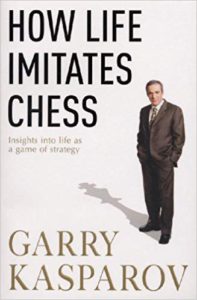 How Life Imitates Chess
How Life Imitates Chess
Topics: Strategy, Values
He was the youngest world champion in chess and remained the longest serving one ever. Garry Kasparov. When asked about secret recipe for that, he joked he had been washing his teeth every night and drinking tonic before each game. But it was just his replica in the spirit of “for silly question, equally solid answer”. When you let him freely talk about his perception of life and decision making, suddenly you fail to keep the notes of all maxims he serves. If Simon Simek sees life as an episode in the eternal Game, this book is like the magnetic counter-pole. Thus, if you want to find out who of these two great authors have come closer to (your) reality, you will not regret to engage in reading this book as well.
Link: https://www.amazon.de/dp/0099489864/
.
.
Who Owns The Future 
Topics: Privacy, Trends, Values
We have voluntarily let observers into our lives. Social networks and the Web generally collect our ideas, preferences and personal information, combine them to create much more interesting, aggregated data. Some conclusions are truly amazing and sharply helpful. Their only mistake is that we don’t own them. Yes, it’s the perfect digital “about us without us”. Most of us are shrugging our shoulders, as that’s just the way it is. But does it really have to? And could it possibly be completely the other way around? What changes in digital ownership (standards and laws) shall we implement so that we are not fenced completely out of the game?
Link: https://www.amazon.de/s?k=Who+Owns+The+Future&i=english-books
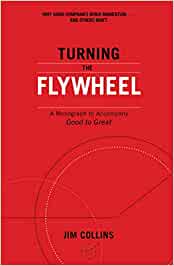
 Managerial Profile
Managerial Profile Managerial Profile:
Managerial Profile: Managerial Profile:
Managerial Profile: Managerial Profile:
Managerial Profile: